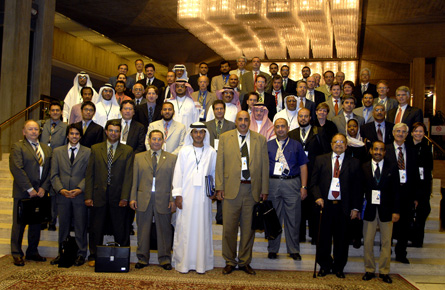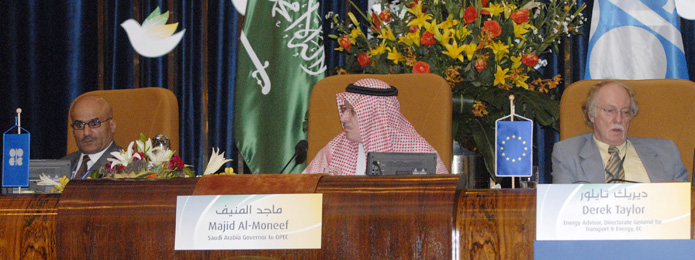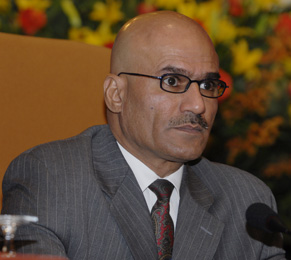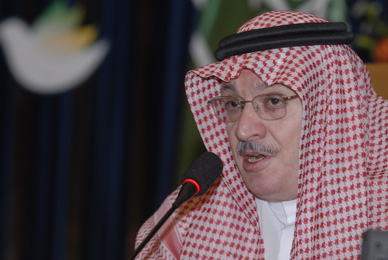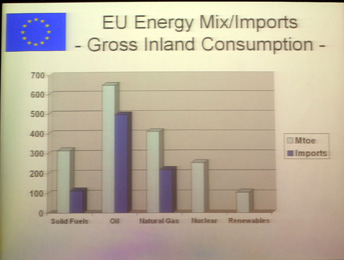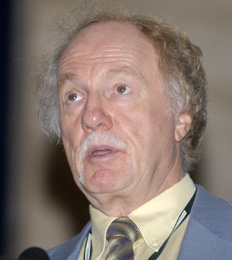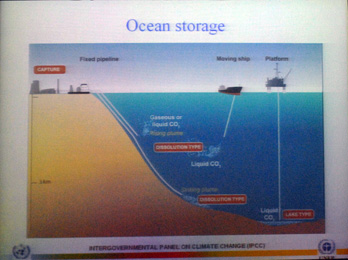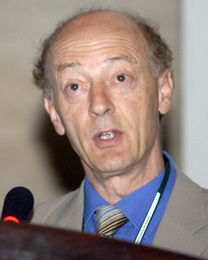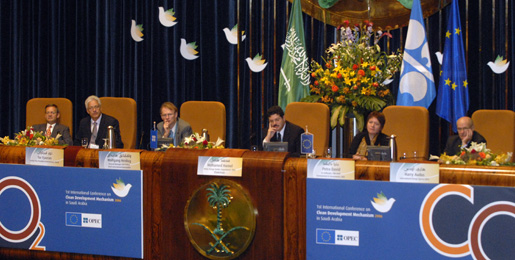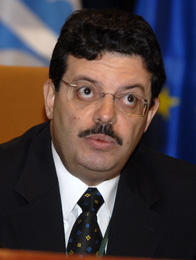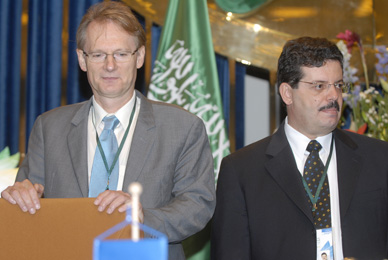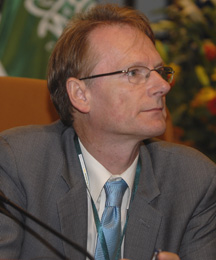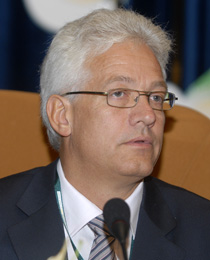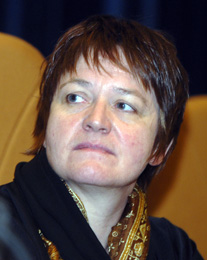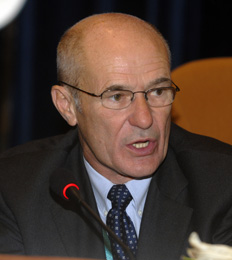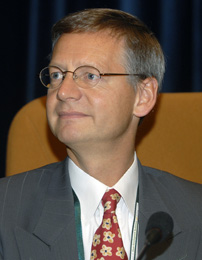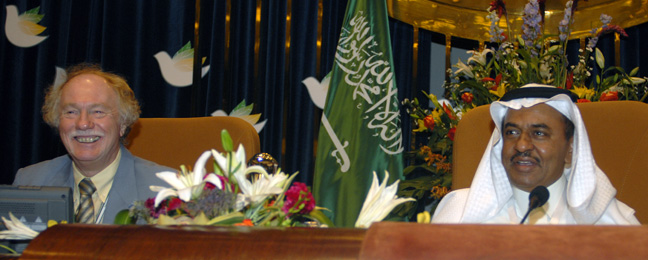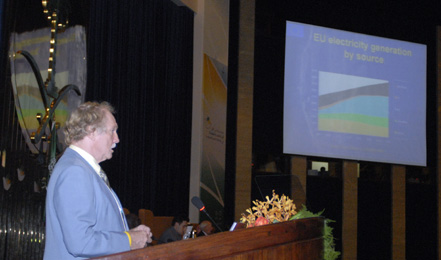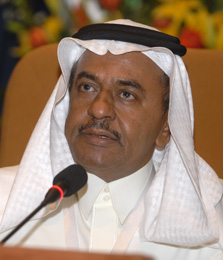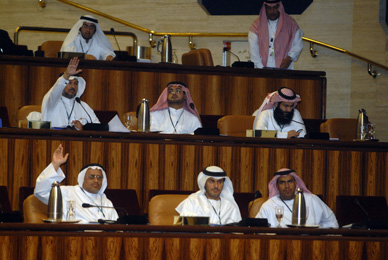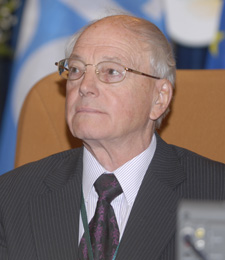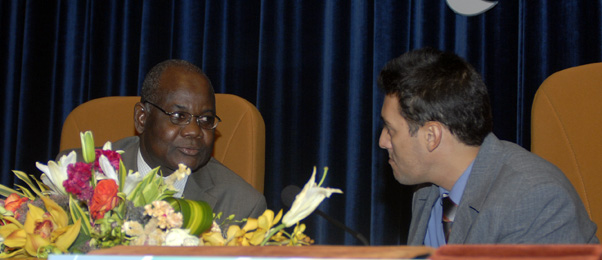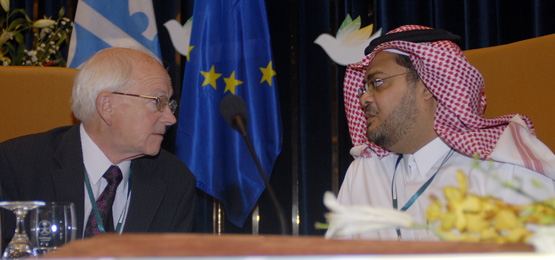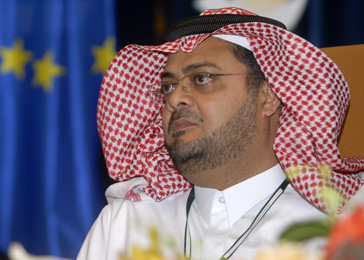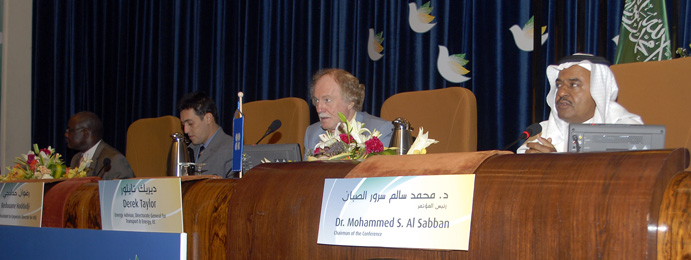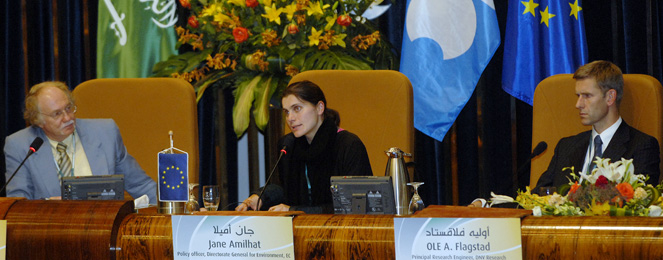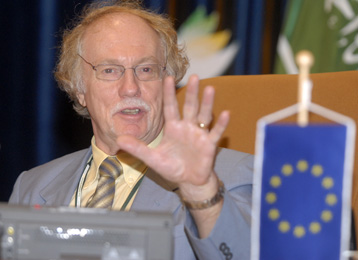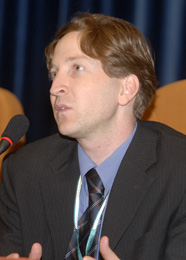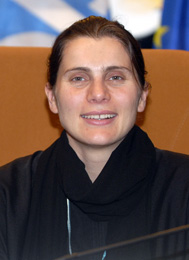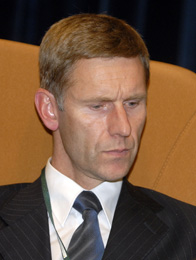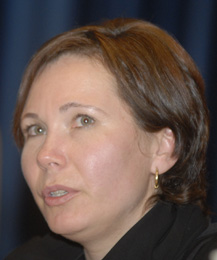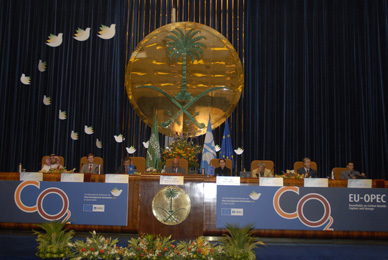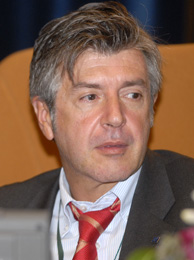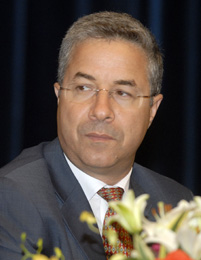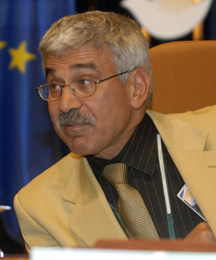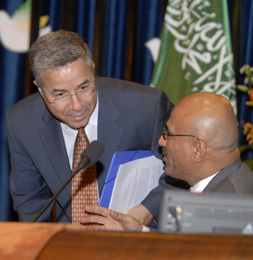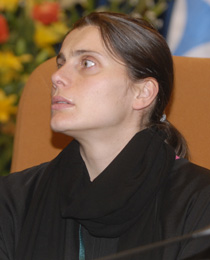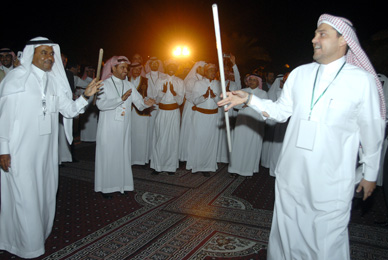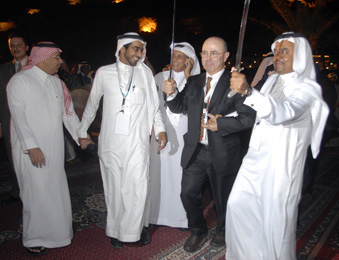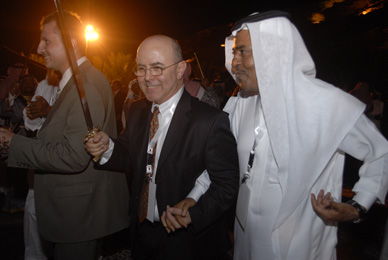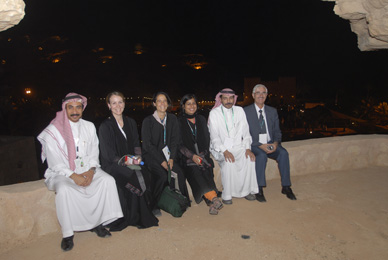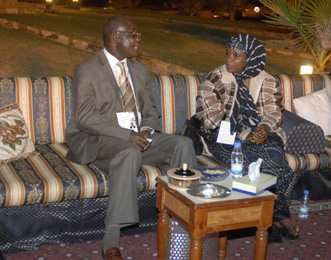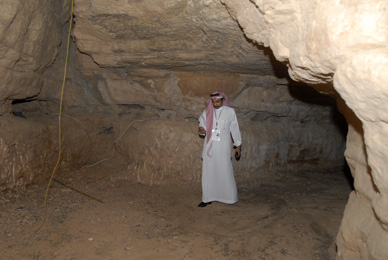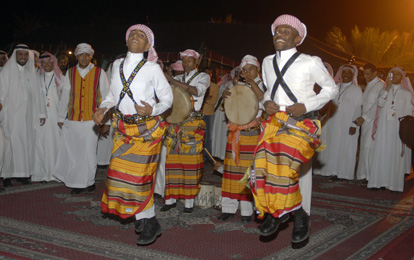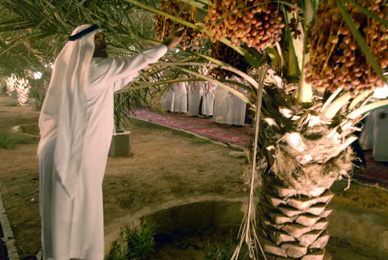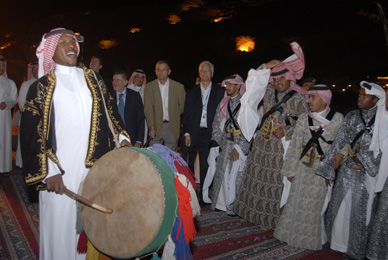|
|
|
Highlights from Thursday, 21 September |
| Following on from the First International Conference on the CDM in Saudi Arabia, an EU-OPEC Roundtable on Carbon Dioxide Capture and Storage (CCS) was held on 21 September, 2006. After an opening session and keynote speech, two sessions were held in the morning, one on CCS technology and one on prospects for CCS in OPEC and EU member countries. In the afternoon, there was a panel session on on non-technical factors essential for CCS breakthrough, followed by a high-level panel on the role of the EU-OPEC Energy Dialogue in promoting CCS technologies. After closing remarks Roundtable Chair, Majid Al-Moneef closed the meeting at 6.03pm. |
EU-OPEC Roundtable on Carbon Dioxide Capture and Storage |
| Participants at the EU-OPEC Roundtable on CCS |
|
Hasan Qabazard, OPEC, Roundtable Chair Majid Al-Moneef, Saudi Arabia's Governor for OPEC, and Derek Taylor, EC |
Hasan Qabazard, OPEC (left), indicated the need to focus on technological options that allow the continued use of oil in a carbon-constrained world. Roundtable Chair Majid Al-Moneef, Saudi Arabia's Governor for OPEC (right), expressed hope that the Roundtable would identify the potential role for the EU-OPEC Energy Dialogue, in cooperation with industry and government, in promoting CCS research and development programs, including through large demonstration projects. |
On the importance of CCS to the EU, Derek Taylor, European Commission (EC), explained that: the EU needs to diversify its energy mix away from imported fossil fuels; the EC is encouraging zero-emission power generation; and several technology routes need to be pursued to this end, including CCS. |
| Keynote address: Leo Meyer, Netherlands Environment Assessment Agency, and Head, Technical Support Unit, Working Group III, IPCC, provided an overview of the IPCC CCS Special Report. |
| Session 1: Overview of Technologies |
Session Chair, Mohamed Hamel, OPEC, highlighted the importance of technology for CCS activities. |
Wolfgang Heidug, International Association of Oil and Gas Producers, provided an overview of geological storage, including how CCS projects can be managed through appropriate site selection, risk assessment and monitoring procedures. Tor Fjaeran, Statoil, outlined Statoil's experience with four large-scale, commercial CCS projects: Sleipner Vest in the North Sea; Snøhvit LNG production in the Barents Sea; In Salah in the Algerian desert; and the Halten carbon dioxide project in mid Norway. Petra David, TNO Built Environment and Geosciences, discussed the EU's integrated project on monitoring and verification of carbon dioxide geological storage called “CO2ReMoVe.”
|
Harry Audus, International Energy Agency, provided an update of CCS technologies and costs. Iain Wright, BP International, presented on the industrial applications of hydrogen manufacture from fossil fuels with carbon dioxide enhanced oil recovery (EOR). |
|
| Session 2: Prospects of CCS in OPEC Member Countries and the EU |
Derek Taylor, EC, and Session Chair Mohammed Al-Sabban, Senior Advisor to the Minister of Petroleum and Natural Resources of Saudi Arabia (right) |
| Derek Taylor, EC, presented on future research and development paths for securing commercial breakthroughs in CCS. Session Chair Mohammed Al-Sabban, Senior Advisor to the Minister of Petroleum and Natural Resources of Saudi Arabia (right), said that CCS provides a win-win solution for environmental protection and economic development, particularly for oil-producing countries. |
Continuing with the topic of research and development paths for CCS breakthroughs, David Pollard, Alstom Power, discussed the Zero Emission Fossil Fuel Power Plan (ZEFFPP) Technology Platform. |
Abiodun Ibikunle, Ministry of State Petroleum Resources of Nigeria, gave a presentation entitled “Reducing GHG Emission Projects – the Nigerian Experience.” Redouane Haddadji, Sonatrech, presented on the In Salah CCS project experience in Algeria and provided an overview of Sonatrech's climate change activities. |
| David Pollard, Alstom Power and Osama Fageeha, Saudi Aramco |
|
Osama Fageeha, Saudi Aramco, provided a petroleum producer's perspective on carbon management and the climate change challenge. |
|
| Session 3: Non-technical factors essential for CCS breakthrough |
| Session Chair Derek Taylor; EC, Jane Amilhat, EU, and Ole Flagstad, DNV |
| Session Chair Derek Taylor, EC (left); Adrian Stott, Mitsubishi UFJ Securities (center), underscored the need for the CDM in ensuring wide implementation of CCS technologies in non-Annex I countries and discussed various features of the CDM in relation to CCS. Jane Amilhat, European Commission (EC) (right), discussed efforts toward an EU Regulatory Framework for CCS. She said that current analysis at the EC reveals that fossil fuel usage will continue and this makes CCS a key priority in climate change mitigation. |
Ole Flagstad, Det Norske Veritas (left), discussed the “ACCSEPT Project,” which was established by the EU in 2006 to address the social, economic, legal and regulatory implications of implementing CCS. Tania Constable, Department of Industry, Tourism and Resources of Australia (right), emphasized that CCS offers an opportunity to continue using fossil fuels in a carbon-constrained world and elaborated on some CCS opportunities worldwide, focusing on the Middle East. |
| High-level panel discussion: The role of the EU-OPEC Energy Dialogue in Promoting CCS Technologies |
| Stathis Peteves, EC (left), highlighted the need for transitioning from discussion to concrete action and close global cooperation, and noted steps being taken by the EU. Said Nachet, International Energy Forum Secretariat (center), noted that CCS will be at the heart of the dialogue between the two “sides” of the energy market for a long time. Adnan Shihab-Eldin, Former Acting Secretary General of OPEC (right), highlighted the need for large-scale demonstration projects in OPEC countries, acceptance of CCS under the CDM, and involvement of the EU in providing value for emissions reduction through EOR. |
| Panel Chair
Hasan Qabazard, OPEC, with Said Nachet, International Energy Forum Secretariat; Jane Anilhat, EC, said that while there cannot be commitments on special incentives for CCS projects, there are possibilities for linkages with the EU Emmissions Trading Scheme. |
| Hasan Qabazard, OPEC (left), emphasized that fossil fuel use will continue and CCS represents a critical technology. He noted that there is a need for better financial mechanisms, clear regulatory guidance, creating demonstration projects and holding a joint workshops in order to develop CCS.
Majid Al-Moneef, Saudi Arabia Governor to OPEC (center), concluded the meeting, suggesting that the EU and OPEC should disseminate the Conference and Roundtable findings widely. He added that the EU-OPEC Energy Dialogue is a way forward for developing a common understanding on shared global issues. Derek Taylor, EC (right), highlighted that CCS technologies alone cannot solve the climate change problem and noted that while the EU has been a leader in addressing climate change, it cannot continue doing so alone. |
| Photos from the reception |
|
|
|
|
|
|
|
|













